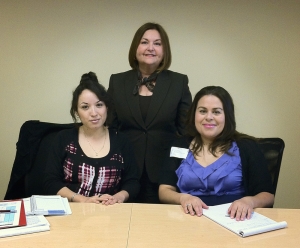Study Enlists Community Health Workers to Battle Chronic Illness, Depression
September 09, 2015 / by Eric Lindberg- Research
Struggling with health issues such as diabetes and heart disease can lead to depressive disorder, which in turn may have a negative effect on the ability of individuals to manage their health care, creating a downward spiral that results in increased mortality.
This issue is particularly critical in low-income communities of color, where residents face high rates of chronic health problems.
A research initiative led by Kathleen Ell, the Ernest P. Larson Professor of Health, Ethnicity, and Poverty at the USC School of Social Work, is exploring how new strategies such as the use of community health workers can help low-income and racially and ethnically diverse populations gain the upper hand on their health and mental health issues.
“They talk about their depression, how hard it is from their perspective to reduce that sadness,” Ell said. “They talk about problems with the care system itself—difficulty getting appointments, having to take a day off work. They talk about problems communicating with nurses or doctors. They are telling us where things are good and where they aren’t good.”
The issue of co-occurring depression and chronic illness is especially concerning in safety-net clinics overseen by the Los Angeles County Department of Health Services. Providers face heavy workloads and thus have little time to dedicate to building a therapeutic relationship with their patients.
Further complicating matters, many patients have limited health literacy and may feel uncomfortable discussing their illness and health care preferences with physicians, leading to poor adherence to treatment and worsening health.
“They are impoverished, mainly Spanish-speaking people with multiple serious medical conditions and depression,” said María Aranda, an associate professor with the USC School of Social Work. “It’s not uncommon that some of them are living day-to-day, living with other people in crowded conditions.”
To help bridge the gap between health care workers and these culturally diverse populations, researchers are testing a new model of care called A Helping Hand, in which a community health worker engages with patients to enhance their health literacy, improve their communication with doctors, and help them connect with other health resources in the community. The study is supported by a $1.3 million award from the Patient-Centered Outcomes Research Institute.
The research team is in the midst of enrolling approximately 350 individuals with major depression and diabetes, heart failure, or coronary heart disease from two community health centers. Patients will be randomly enrolled in usual care or the A Helping Hand program to determine whether the program improves their ability to manage their depression and health problems, attend clinic appointments, and develop stronger relationships with their health care providers.
Key outcomes include whether support from community health workers, known as promotoras, will reduce depression and the frequency of patient hospitalizations and emergency room visits, increase self-management of chronic diseases, and enhance satisfaction with care. Ell said the promotora concept resonated with several patients who are members of the study’s stakeholder advisory group.
“They prefer the idea of having a promotora or community health worker who can talk to them at their language and literacy level,” she said.
Promotoras are often bilingual community members who have a natural ability to interact with their peers and a heartfelt attitude toward improving the quality of life in their neighborhoods.
The project team collaborated with Visión y Compromiso, the leading promotora organization in California, to hire three promotoras to offer practical assistance to patients regarding problem-solving skills and education about depression, diabetes, and other chronic illnesses. They received specialized training in how to deliver psychosocial care and help patients navigate the health care system.
“They are community resource experts, so they also provide ongoing linkages to financial, legal, and housing services, among others,” said Aranda, whose responsibilities as study coinvestigator included training the promotoras. “Usually they will have the pulse on what is happening in the community. They spend a little more time with the patient, so they are able to get much more information across a number of domains, including health, mental health, and social services.”
Promotoras are increasingly being employed in the health care sector as the United States shifts toward a patient-centered care model in which a team of health care workers, often including a physician, nurse, social worker, and community health worker, provides wraparound services to each client.
Although progress is slow, Ell said she remains optimistic that the U.S. health care system is moving in the right direction, albeit slowly, with its new focus on multidisciplinary care.
“My concern is the political process—it’s frustrating to listen to the political discussions about health care and the Affordable Care Act,” she said. “We have to try some new things. We have to change how we provide care.”
If the study indicates that offering support from promotoras is a cost-effective strategy to improve health care in vulnerable communities, the researchers are hopeful that the model will be adopted throughout Los Angeles County and in other regions with large populations of low-income and culturally diverse individuals.
To reference the work of our faculty online, we ask that you directly quote their work where possible and attribute it to "FACULTY NAME, a professor in the USC Suzanne Dworak-Peck School of Social Work” (LINK: https://dworakpeck.usc.edu)
